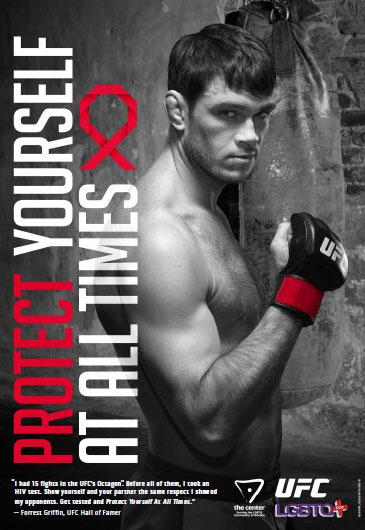Ultimate Fighting Champion Forrest Griffin’s New Campaign to Stop HIV Is A TKO
By Jase Peeples
Originally published: The Advocate 12/1/13 and Plus Magazine 2/25/14

The Ultimate Fighting Championships may be best known for takedowns, tapouts, and TKOs, but the mixed martial arts organization is working hard to become a heavy hitter in the world of HIV education as well.
In October, the UFC announced it had partnered with the Gay and Lesbian Community Center of Southern Nevada – a.k.a. the Center – for a new HIV awareness campaign titled “Protect Yourself at All Times.” The campaign has been rolled out in the weeks leading up to today, World AIDS Day, and was designed to specifically raise awareness of the virus among people under 30.
When UFC Hall of Famer Forrest Griffin heard about the campaign he knew he wanted to be involved, but he was even further motivated after learning HIV infection rates were on the rise in young people as well. “I grew up in a different era,” Griffin says. “People were definitely afraid of HIV back then, but education also helped change the way we thought about the disease. That education helped my generation make smarter choices about the way we protected ourselves. I was surprised to learn HIV infection rates were on the rise in young people, and I wanted to help change that.”
Griffin, who is one of the spokesmen for the campaign, says he feels complacency about HIV is an undeniable contributor to the rising infection rates in young people. “People don’t talk about HIV like they used to,” he says. “Because fear of the disease has lapsed, we’ve sort of forgotten about it. But HIV is still out there and we’ve got to instill the importance of protecting yourself in a generation who didn’t see the terrible effects of the disease in the ’80s and ’90s.”
As a part of the Protect Yourself at All Times campaign, several UFC athletes and personalities have been lending their muscle by visiting centers nationwide that offer free HIV tests and educational initiatives. Public service announcements across a variety of media outlets are also in the works, and the UFC will fully support the Center’s LGBTQ+ program, which offers free HIV tests to the wider Las Vegas community.
In addition to furthering awareness of HIV, Griffin views the UFC’s partnership with an LGBT organization like the Center as an opportunity to fight homophobia in sports as well. “I think anyplace people can be themselves is a good thing,” Griffin says. “I went to the groundbreaking of the Center years ago, and I’ve been the UFC’s representative at many events there. I’ve met so many cool people at the Center over the years, and if my involvement in this can help open people’s mind, even better.”

Though the partnership is the first of its kind for the UFC, the MMA organization has been actively working toward leveling the field for LGBT athletes and fans as well. The sport embraced fighter Liz Carmouche after she revealed she was a lesbian, and fans have playfully nicknamed themselves “Lizbos” in a show of support. The UFC has also suspended fighters for the use of antigay slurs, and UFC President Dana White has encouraged gay fighters to come out. “It’s a continuation of something that started a long time ago,” says Griffin. “ Gay, straight, whatever — none of that actually matters when you’re fighting someone. Not what you have in your bank account, what you drive, what sex you are, none of it. I think that’s the message the UFC has been trying to push.”
Griffin says he’s proud to be a part of an organization that’s attempting to make positive change in sports, but he’s aware there is a lot of work ahead before homophobia is a distant memory. “It’s long been a problem,” he admits. “But I’m not just talking about the UFC — I mean homophobia in sports in general and athletes sometimes say really stupid things. That’s why I think it’s great to see there are even commercials being played during the Super Bowl educating people about saying ‘that’s gay’ and how it can be offensive to gay people. When I was younger it was something we never thought about, and I’d like to think that most people who’ve said that kind of stuff don’t hate gay people, it was just a term that was in use. But it’s only by hearing how it can affect people that we realize how those things can really cause a lot of hurt.”
Throughout his career, Griffin has also been a coach and mentor to many aspiring UFC fighters, and while the sport has yet to gain its first out male mixed martial artist, he expects the UFC will greatly benefit from any athlete who is brave enough to be the first. “I know not everyone would receive him well, but I think it would be best if some male fighter did come out,” Griffin says, adding some words of encouragement for anyone who may be contemplating opening up publicly about being gay. “Of course, like anything else, it’s going to be hard to be the first to do something — to be in that category by yourself. But that being said, others will follow later. Whoever that person ends up being, they are going to be a mentor to a lot of other people by setting an example. And my thing is, nobody should have to hide who they are. If you have to lie about yourself to anyone, they aren’t worth having in your life.”